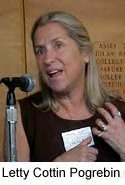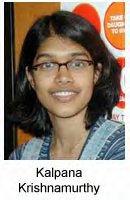 |
A CLASH OF WAVES
Second and Third Wave Feminists Clash Over the Future
Run Date: 05/26/02 By Jennifer Friedlin
WEnews correspondent
A growing conflict between two generations of feminists comes to light at a recent
Veteran Feminists of America conference. Do women in their 20s appreciate what was done 30 years ago? Do women
in their 50s understand what women young now still cope with? Photo courtesy of Liz Budniz.
NEW YORK (WOMENSENEWS)--Feminists have never been known for their uniformity of opinions, so it should come as
no surprise that the transition from the second to the third wave of feminists has left a clear rift between the
generations.

Feminist revolutionaries from the 1960s and 1970s gathered at a recent conference at Barnard College in New York to share their thoughts on the effects their words and actions have had on the history of the United States. Although the conference, sponsored by the Veteran Feminists of America, was designed as a celebration of Photo courtesy of Liz Budniz.feminist non-fiction and fiction literature and not as a forum to discuss the problems with the women's movement today, the theme of "us versus them" emerged time and again.
The first wave refers the movement to obtain the right to vote which lasted 72
years. The women's movement of the 1960s and 1970s is generally referred to as the second wave. The more recent
efforts led by women in their 20s and 30s is generally called the third wave.
Comparing the collectivist drive that defined the feminist movement during the second wave to the more individualist
attitude prevailing among women today, several panelists said they were concerned about the future of the movement.
"If there should be an economic downturn or right-wing forces try to twist things to say women should go home again, I hope that women would have the consciousness to resist," novelist Marilyn French told the approximately 100 members of the predominantly graying audience on April 26.
French's doubts about younger women's collective consciousness were echoed by a number of other members of the panel, which featured Susan Brownmiller, Letty Cottin Pogrebin, Erica Jong, Phyllis Chesler, Barbara Seaman, Betty Friedan, Judith Rossner, Catharine Stimpson, Marlene Sanders, Alix Kates Shulman and Mary Gordon. (Sanders is a Women's Enews board member.)
1970s Were 'Earthshaking'
Several of the second wave women spoke of the transition from a movement based on the "we" to today's
sea of disparate "I's," fighting for their individual gains without a thought about the past, present
or future of the feminist cause. Reveling in the glory of the second wave, speakers such as Brownmiller bemoaned
the current climate in which feminism has become a dirty word and collectivist action is considered passe.
"However active people are today, whatever we had in the 1970s was earthshaking,"
Brownmiller said.
Somewhere along the road, however, the earthshaking force that helped revolutionize America and elevate women's
status dissipated as the political and social climate turned reactionary. Unforeseen and somewhat disappointing
consequences resulted. "I don't hear strong, clear feminist voices today," Brownmiller said. "I
don't see women coming up with new theories." In addition to the emergence of a more "me-oriented"
culture, the emphasis on "family values" and the media's growing interest in stories about careerist
women who regret not having had children have relegated feminism to the backburner, the panelists said. Meanwhile,
as they ride on the coattails of the successes of the feminist movement, young women no longer feel a sense of
urgency to mobilize.
Older Feminists Dismayed by Young's Sense of Entitlement
A number of panelists expressed their dismay with the prevailing sense of entitlement common among women while
unresolved feminist causes, such as child care and economic disparity, abound.
"We were action-oriented in a public, political context. We had to challenge laws, change patterns, alter
behavior," Pogrebin said. "Being able to bare your midriff . . . is fine as an expression, but it doesn't
mean things are going to change."
Other speakers focused on the positive side of the equation.
"Because of our books, we changed society. Without 'Fear of Flying,'" said Erica Jong, author of the
revolutionary book, "there would be no 'Sex in the City.' My daughter wouldn't feel empowered."
"We have produced a generation of uppity women who feel entitled," Jong added.
Third Wave Counters Criticisms
Such comments failed to satisfy the smattering of younger women in the audience, who said the second wave of feminists has grown so preoccupied with its achievements that it's become blind to the real efforts and strides being made by the third wave of feminist organizers.
Speaking after the panel discussions, Jennifer Baumgardner, the 31-year-old activist and co-author of "Manifesta: Young Women, Feminism, and the Future," assailed the participants for what she described as their failure to see the vibrancy in the feminist movement today.
"Most of these women don't go to my abortion fund-raisers," said Baumgardner, referring to the types of events she and her compatriots sponsor. "Because the work doesn't look the same, they don't want to see it."
"I'm surprised by the amount of people who were really innovative in their
youth and refuse to see innovation in the youth," Baumgardner added. Photo courtesy of the Ms. Foundation.

Kalpana Krishnamurthy, co-director of the Third Wave Foundation, a New York-based organization that supports women
between the ages of 15 and 30, said one reason for the discord is feminism's evolution from a movement focused
on a handful of issues into a movement that pervades all aspects of society. While feminists in the second wave
were more focused on fighting for gender equality in the workplace, abortion rights and economic parity, today's
activists say they are looking at a wider range of topics through the feminist lens.
Rather than seeing this as evidence of a dissipated movement, Krishnamurthy sees
it as a sign of greater freedom. Younger women now have the liberty to offer their unique perspectives on everything
from arts and culture to prison reform.
"I think that the impact of the feminist movement was in helping women to achieve a voice," said Krishnamurthy,
25. "Now, we are articulating that voice in a multiplicity of ways."
While the two waves of feminists appear to be embroiled in a conflict over the nature of the feminist movement as it forges--or at least wobbles--ahead, the conference served to awaken in some people the idea that the time has come for feminists young and old to talk.
Conference co-chair Sheila Tobias noted that the unexpected detour the event took had stirred up some personal concerns about the divide between feminists of different eras. As a result, Tobias said the Veteran Feminists of America would now consider sponsoring a meeting for feminists of different generations.
"Given the interest and the need, I think we certainly should schedule an
event to get a dialogue going between the veterans and the younger feminists," Tobias said.
Jennifer Friedlin is a freelance writer based in New York.
For more information:
Third Wave Foundation:
http://www.thirdwavefoundation.org
Manifesta Web site:
http://www.manifesta.net/